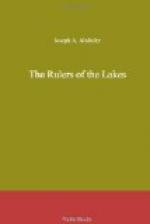Master Benjamin Hardy sighed.
“Doubtless you are right, Robert,” he said, “and perhaps at your age I should have taken the same view, despite Jonathan’s assertion that my true ways are the ways of commerce and gain. Nevertheless, my interest in this struggle is great. It is bound to be since it means vast changes in the colonies, whatever its result.”
“What changes do you have in mind, Mr. Hardy?”
“Mental changes more than any other, Robert. The war in its sweep bids fair to take in almost all the civilized world we know. We are the outpost of Britain, Canada is the outpost of France, and in a long and desperate strife such as this promises to be we are sure to achieve greater mental stature, and to arrive at a more acute consciousness of our own strength and resources. Beyond that I don’t care to predict. But come, lad, we’ll not talk further of such grave matters, you and I. Instead we’ll have a pleasant hour with Mynheer Jacobus Huysman, a man of no mean quality, as you know.”
Mynheer Jacobus was at home, and he gave them a great welcome, glancing at one and at the other, and then back again, apparently rejoiced to see them together.
Then he ordered a huge repast, of which they ate bountifully, and upon which he made heavy inroads himself. When the demands of hospitality were somewhat satisfied, he put aside knife and fork, and said to Mr. Hardy:
“And now, old friend, it iss no impertinence on my part to ask what hass brought you to Albany.”
Master Benjamin, who was gravely filling a pipe, lighted it, took one puff, and replied:
“No, Jacobus, it is no impertinence. No question that you might ask me could be an impertinence. You and I are old friends, and I think we understand each other. I have to say in reply that I have come here on a matter of army contracts, to get a clearer and better view of the war which is going to mean so much to all of us, and to attend to one or two matters personal to myself.”
Robert, excusing himself, had risen and was looking out of a window at a passing company of soldiers. Mynheer Jacobus glanced at him and then glanced back at the merchant.
“It iss a good lad,” he said, “und you watch over him as well as you can.”
“Aye, I do my best,” replied Hardy in the same subdued tones, “but he is bold of spirit, full of imagination and adventurous, and, though I would fain keep him out of the war, I cannot. Yet if I were his age I would go into it myself.”
“It iss the way of youth. He lives in times troubled und full of danger, yet he hass in the hunter, Willet, and the Onondaga, Tayoga, friends who are a flaming sword on each side of him. Willet hass a great mind. He iss as brave as a lion und full of resource.”
“Right well do I know it, Jacobus.”
“And the young Onondaga, Tayoga, is of the antique mold. Do I not know it, I who haf taught him so long? Often I could think he was a young Greek or Roman of the best type, reincarnated und sent to the forest. He does haf the lofty nature, the noble character und simplicity of a young Roman of the republic, before it was corrupted by conquest. I tell you, Benjamin Hardy, that we do not value the red men at their true worth, especially those of the Hodenosaunee!”




